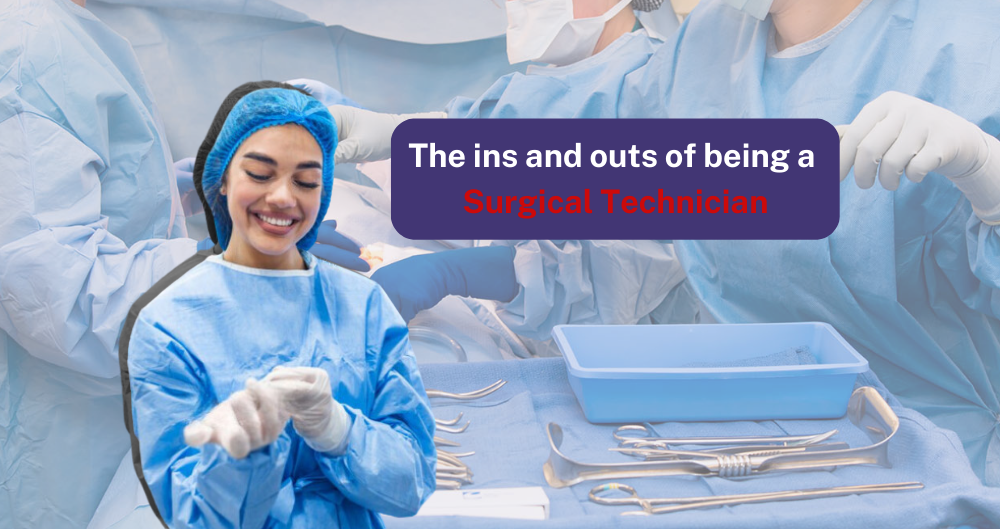Career overview
Advancements in surgical technology increase the demand for STs in the ever-growing field of surgery. With proper training and experience, they can explore opportunities in various healthcare settings. More than a promising job outlook, a bright future awaits this career. Check out the list below to learn more about this job.
Job Responsibilities:
-
Assisting the surgical team.
-
Preparing the operating room and ensuring a sterile environment.
-
Assisting in patient positioning and draping.
-
Handing instruments and supplies to the surgeon during procedures.
-
Ensuring aseptic techniques and infection control.
-
Maintaining sterile fields and preventing contamination.
-
Proper handling and disposal of surgical instruments and materials.
-
Communicating effectively with surgeons, nurses, and anesthesiologists.
-
Anticipating the needs of the surgical team during procedures.
Where they can work:
-
Hospital operating rooms
-
Outpatient surgical centers
-
Doctor’s offices
-
Specialty clinics such as cardiology, dentistry, ENT, dermatology, oncology, etc.
-
Surgical centers
Job Outlook (May 2021):
-
$48,510 average annual salary.
-
$23.32 average wage per hour.
-
Employment growth of 6% from 2021 - 2031.
-
Projection of 9,600 job openings nationwide every year.
Education and Training
To become an ST, they will need a certificate program that includes specialized education and training. Since you’ll be working with surgeons and other professionals, employers prefer having a certification. The National Board of Surgical Technology and Surgical Assisting (NBSTSA) gives the most common Certified Surgical Technologist (CST) credential.
Training programs for STs take around 12 months for a certificate. Associate degrees are available and can take at least two years to complete. Most programs and training providers will need a high school diploma or similar. Taking prerequisite courses like anatomy and physiology, medical terminology, and microbiology is beneficial too. STs may receive their higher education training from the following:
-
Community colleges
-
Vocational schools
-
Universities
-
Hospitals and
-
The Military
At Dreambound, we have all the resources to offer you the most accessible and affordable classes you can take. You can choose your training schedule depending on your availability and location. By investing in your education and choosing the right school, you’re already one step closer to your dream career.
Qualities and skills needed
To become part of this amazing career, you must have valuable skills and qualities. The role of an ST needs a combination of abilities to deliver effective support to surgeons. You’ll get to harness these essential skills as you go along with your career anyway. To start, having these skills will set you on the right track:
-
Medical Terminology. Familiarity with medical terminology is essential for understanding your colleagues. You must be proficient in medical terminology to communicate within the surgical environment.
-
Anatomy and Physiology. Understanding the human body is crucial for assisting surgeons during procedures. By knowing basic anatomy and physiology, you can comprehend while helping them.
-
Sterilization Techniques. STs must be well-versed in proper sterilization techniques. This is to maintain a sterile surgical environment and prevent infections.
-
Surgical Instrumentation. Knowledge of various surgical instruments is vital for assisting surgeons. This is to ensure proper instrument usage.
-
Operating Room Protocols. You must understand operating room protocols. This includes growing, gloving, and maintaining a sterile field. This is essential for maintaining a safe and sterile surgical environment.
-
Surgical Procedures. Familiarity with different surgical procedures is crucial for anticipating the surgeon's needs. If you know these, you’ll provide effective help.
-
Attention to Detail. STs must have strong attention to detail to ensure accurate record-keeping. Surgeons will expect you to have precise counts, so you must be keen on these small details.
-
Communication and Teamwork. Effective communication and teamwork skills are the most important when collaborating with surgeons. Not only them but also other healthcare professionals on the team. This is because they expect you to be an effective and efficient support to them.
-
Problem Solving. STs should be able to solve problems that may arise during procedures. These may include equipment malfunctions or unexpected situations.
-
Stress Management. The surgical environment can be high-pressure and demanding. Developing effective stress management is important for maintaining focus and delivering quality care. You must know how to take care of yourself first before you can care for others.






